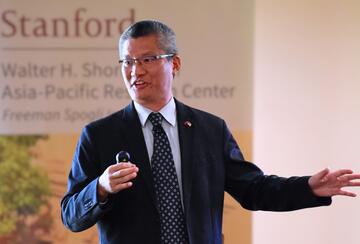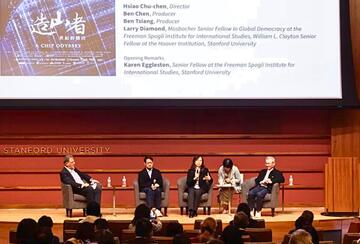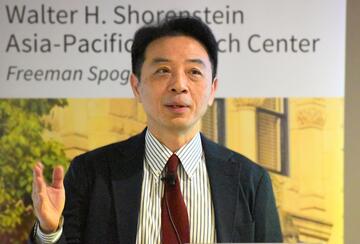Taiwan News
Using data from "American Portrait," a Taiwan-based survey that investigates the public's perception of the United States and China, political economist Wen Chin Wu of Academia Sinica unpacks how the Taiwanese public feels about security, self-defense, and reliance on external partners.
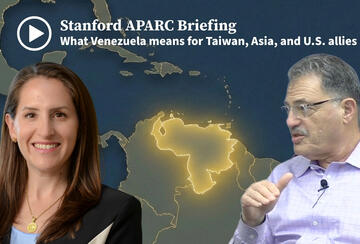
Speaking on the APARC Briefing video series, Larry Diamond and Oriana Skylar Mastro analyze the strategic implications of the U.S. operation in Venezuela for the balance of power in the Taiwan Strait, Indo-Pacific security, America’s alliances, and the liberal international order.
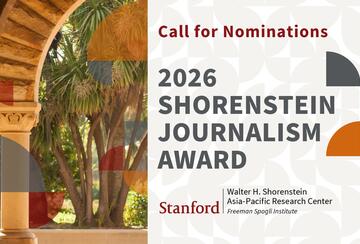
Sponsored by Stanford University’s Shorenstein Asia-Pacific Research Center, the annual award recognizes outstanding journalists and news media outlets for excellence in covering the Asia-Pacific region. News editors, publishers, scholars, and organizations focused on Asia research and analysis are invited to submit nominations for the 2026 award through February 15, 2026.
A screening and discussion of the documentary 'A Chip Odyssey' underscored how Taiwan's semiconductor ascent was shaped by a collective mission, collaboration, and shared purpose, and why this matters for a world increasingly reliant on chips.
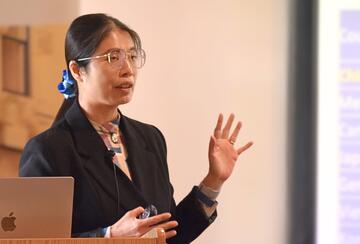
Taiwan’s experience reveals that trade credit linkages are a substantial transmission channel for global trade shocks, according to research by National Chengchi University’s Hsiao-Hui Lee, an expert in supply chain management. Her work highlights the need to include financial network management in strategies for supply chain resilience.
Weitseng Chen of the National University of Singapore explores how legal modernization can entrench rather than erode authoritarian power, an unexpected result of a legal mechanism that underpins functioning democracies.
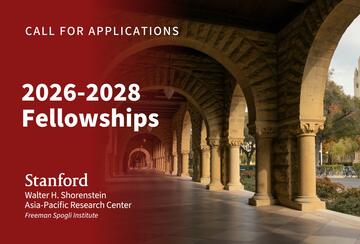
The center offers multiple fellowships in Asian studies to begin in fall quarter 2026. These include a postdoctoral fellowship on political, economic, or social change in the Asia-Pacific region, postdoctoral fellowships focused on Asia health policy and contemporary Japan, postdoctoral fellowships and visiting fellow positions with the Stanford Next Asia Policy Lab, and a visiting fellow position on contemporary Taiwan.
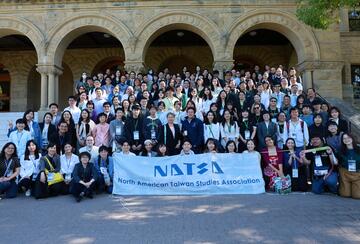
Taiwan Studies Students and Scholars Gather at Stanford to Advance New Directions for the Field
The North American Taiwan Studies Association’s 2025 conference invited participants to embrace the “otherwise,” elevating overlooked aspects of Taiwan and reimagining the field of Taiwan studies to challenge dominant narratives and disciplinary methodologies.
At its first convening in Taiwan, APARC’s Taiwan Program gathered scholars and industry experts to consider policy measures and practices for tackling the technological, economic, social, and demographic forces shaping the island nation’s future and strategies for ensuring its continued growth and success.

Sponsored by Stanford University’s Shorenstein Asia-Pacific Research Center, the annual Shoresntein Award promotes excellence in journalism on the Asia-Pacific region and carries a cash prize of US $10,000. The 2025 award will honor an Asian news media outlet or a journalist whose work has primarily appeared in Asian news media. Nomination entries are due by February 15, 2025.

Held at Stanford and hosted by the Shorenstein Asia-Pacific Research Center, the third annual Dialogue convened global leaders, academics, industry experts, and emerging experts to share best practices for advancing Sustainable Development Goal 9 in support of economic growth and human well-being.

In the era of Xi Jinping, the Chinese Communist Party has reasserted control over the recollection and retelling of the past as vital sources for shaping Chinese national identity and global power projection, says Chris Buckley, the chief China correspondent for The New York Times and the recipient of the 2024 Shorenstein Journalism Award.

Open Faculty Positions in Japanese Politics and Foreign Policy, Korean Studies, and Taiwan Studies
Stanford University seeks candidates for a new faculty position in Japanese politics and foreign policy, a faculty position in Korean Studies, and a new faculty position on Taiwan. All three appointments will be at the Freeman Spogli Institute for International Studies and affiliated with Shorenstein APARC.

Held at Stanford University on October 10-11, 2024, the third annual Trans-Pacific Sustainability Dialogue will unite social science researchers, scientists, policymakers, and emerging leaders from Stanford University and the Asia-Pacific region to accelerate resilient infrastructure, promote inclusive and sustainable industrialization, and foster innovation.

Stanford’s Asia-Pacific Research Center Invites Applications for Fall 2025 Asia Studies Fellowships
The Center offers multiple fellowships for Asia researchers to begin in Autumn quarter 2025. These include postdoctoral fellowships on Asia-focused health policy, contemporary Japan, and the Asia-Pacific region, postdoctoral fellowships and visiting scholar positions with the Stanford Next Asia Policy Lab, a visiting scholar position on contemporary Taiwan, and fellowships for experts on Southeast Asia.

The Taiwan Program at the Shorenstein Asia-Pacific Research Center will serve as a Stanford hub and catalyst for multidisciplinary research and teaching about contemporary Taiwan. The program’s inaugural conference convened industry leaders, scholars, and students to examine Taiwan’s challenges and opportunities.

The program will explore policy-relevant approaches to address Taiwan’s contemporary economic and societal challenges and advance U.S.-Taiwan partnerships.

One postdoctoral fellow position and one visiting scholar position beginning in Autumn Quarter 2024 are available to scholars and professionals interested in interdisciplinary research on contemporary Taiwan.


